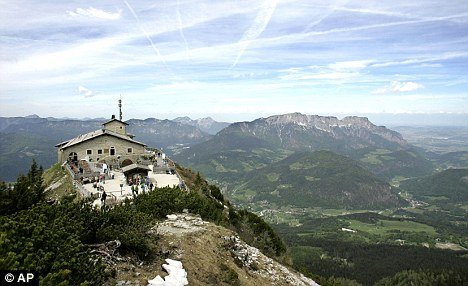
Adolf Hitler’s tea house, placed on the top of a Bavarian mountain, has become one of the most visited sites in Germany.
German Tourism authorities announced that over 300,000 people visited the tea house in a year. This is nearly 30,000 up on last year.
The tea house on the peak of the Kehlstein Mountain was built for Hitler as a 50th birthday gift by Nazi party secretary Martin Bormann in 1939.

Hitler’s Berghof home on the mountain was destroyed by the Allies in bombing raids and after WW2, but the tea house survived and became a tourism attraction in peacetime.
According to officials, most visitors to the mountain are Americans followed by Britons; combined they make up 85% of the people who came to see where Hitler ate cream cakes with his mistress Eva Braun and snoozed in chintz chairs as the world war he started raged.
Germans make up just a small proportion of visitors to the “Eagle’s Nest” tea house.
For 20 euros (about $30) , visitors to the house 6,000 feet up are rewarded with spectacular views and can get refreshments from the privately run restaurant, including roast pork with dumplings and cabbage, salads and sandwiches, that operates in summer months inside it.
There is even a gift shop.
Visitors access the tea house on a bus via a serpent-like mountain road called the Kehlsteinstrabe and enter a golden brass lift built into the mountain side, itself accessed via a tunnel through the granite.
The Kehlsteinhaus (Eagle’s Nest in English) is built in a chalet-style taking 13 months to construct.
The tea house was finished in the summer of 1938 before it was presented to Hitler a year later, but he only made a few visits to the chalet partly due to his fear of heights.
After the war, the retreat place was used by the Allies as a military command post until 1960 when it was handed back to the State of Bavaria.
The new tourist attraction is 1834m above sea level and is perched on a rock wall having cost 30 million Reichsmarks to build (about $180 million today).